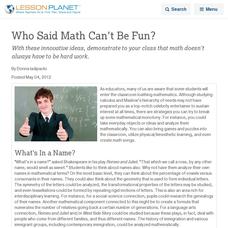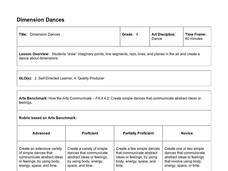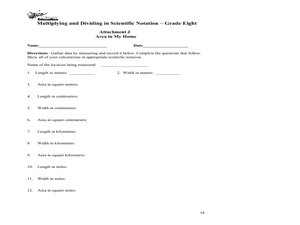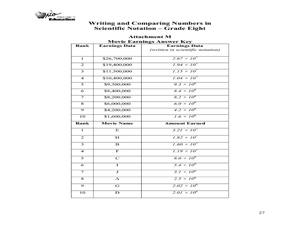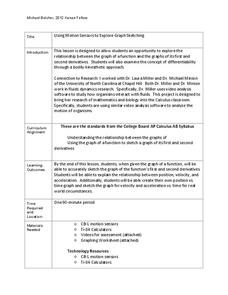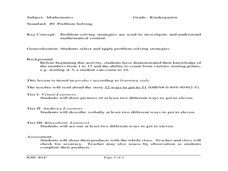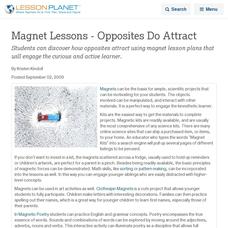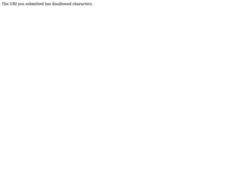Curated OER
What's Shaking? Three-Lesson Unit
Your young architects use the Internet to research tall structures or sky scrapers to help in the design of their scale drawings. This is lesson one of three in which learners design, build, and test model skyscrapers for seismic safety....
EngageNY
Rational Numbers on the Number Line
Individuals learn how to plot rational numbers on the number line in the sixth lesson of a 21-part module. They identify appropriate units and determine opposites of rational numbers.
Curated OER
Who Said Math Can't Be Fun?
With these innovative ideas, demonstrate to your class that math doesn't always have to be hard work.
Curated OER
The Ants Go Marching
Integrate art, math, life science, music, and fun in this beginning addition and subtraction activity. Children kinesthetically represent adding and subtracting numbers to 10; they stand up one at a time as you count forward and sit down...
Curated OER
Plate Tectonics: First Grade Lesson Plans and Activities
A set of first grade geology lessons focuses on plate tectonics and movement of plate boundaries. During the pre-lab, learners experience three types of plate movement through a kinesthetic demonstration. The lab demonstrates stresses...
Curated OER
Math, Fractions, and Music
Students discover the relationship between musical rhythms and fractions. They add musical notes together to produce fractions and create addition and subtraction problems with musical notes. Students complete worksheets and create their...
K-5 Math Teaching Resources
Fraction Strips
Reach out to your visual and kinesthetic learners with this set of printable fraction strips. Not only is this resource a great way to develop children's fractional number sense, it's bound to capture their engagement as well.
National Museum of Mathematics
Hands-On Data Analysis
Jump at the chance to use this resource. A kinesthetic activity has classmates jumping in several different ways (standing, single-step, and multiple-step jumps) to create handprints on poster paper taped to the wall. They measure the...
Hawaiʻi State Department of Education
Dimension Dances
Use dance to help learners conceptualize line segments, rays, lines, and planes. They choreograph dances that show dimensional space. Dancers start by pondering space, point, and lines as the teacher draws them in the air. Each movement...
Curated OER
The Greedy Dog
Teach young mathematicians the concepts of greater than, less than, and equal to with kinesthetic, visual, verbal, and numeric approaches. In a playful session that addresses multiple intelligences, your class will: dramatize a greedy...
Curated OER
Yummy Gummy Subtraction
Here is a quick 15 minute lesson intended to introduce subtraction. Learners count and subtract gummy bears to complete 5 problems. The lessons suggest that the gummy bears can be saved and used the next day, but gummy bears get gross...
Curated OER
Metric Magic
Sixth and seventh graders construct a "metric machine" as a kinesthetic aide in converting from one unit to another in grams, liters, or meters. They complete a metric activity on the Internet and view about five minutes of a video on...
Ohio Department of Education
Multiplying and Dividing in Scientific Notation - Grade 8
Here is really nice set of resources on scientific notation. Eighth and ninth graders explore the concept of multiplying and dividing in scientific notation. In this multiplying and dividing numbers in scientific notation instructional...
Ohio Department of Education
Writing and Comparing Numbers in Scientific Notation-Grade Eight
Explore scientific notation in this mathematics lesson plan. Young mathematicians explore multiple representations of large number in scientific notation through the use of models, visual representation and expanded form. The lesson plan...
Houghton Mifflin Harcourt
Use Money
Give this to your second and third grade class to practice counting coins. There are six word problems given. Consider giving each learner a few dollars in coins to help kinesthetic learners. Also consider reviewing the word fewer before...
Core Knowledge Foundation
A “Whole” Lot of Fraction Fun!
Young mathematicians are introduced to fractions in a unit that helps them to understand parts of a whole.
Curated OER
Rap Your Way Through Integers
Your resource or special education class will have fun with this interesting approach to learning about integers. They use rap, movement, and an interactive online game to reinforce the rules of integers. A well-rounded instructional...
Kenan Fellows
Using Motion Sensors to Explore Graph Sketching
Get moving to a better understanding of graphs of derivatives. Using motion sensors, scholars vary their velocities to create graphs of the first derivative of a function. The activity challenges groups to first create a script of the...
Curated OER
Learning Styles in Math
Students discover which learning style works best for them in a math setting. In this math comprehension lesson, students create different combinations of numbers that equal the sum of 11. Students determine if they are better visual,...
Curated OER
Integrating Math and Science
Student understanding of math concepts improves when math is integrated with science!
Curated OER
Magnet Lessons - Opposites Do Attract
Students can discover how opposites attract using magnet lesson plans that will engage the curious and active learner.
ISTE
Let's Count to 10
Learners form groups of zero to 10 objects. They connect number names to groups, compose and decompose numbers, and use numerals to record the size of a group. The comprehensive, eight-component mini unit addresses the needs of visual,...
Hawaiʻi State Department of Education
Symmetrical Objects
In order to better understand how to locate a plane of symmetry in 3-dimensional objects, learners create a dance. The class reviews dance and math symmetry, then they practice making symmetrical shapes and movements with a partner. They...
Curated OER
Multiplication
Students practice their multiplication facts by reinforcement and repetition. Students write facts in their math journals, and use labeled soccer ball and deck of cards to practice multiplying by "number of the day." Play continues until...




